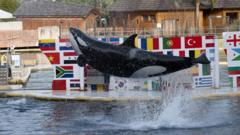The closure of Marineland Antibes in France has raised concerns over the future of two orca whales, with proposals for their relocation leading to widespread debate on animal welfare and the ethics of keeping marine mammals in captivity.
Uncertainty Shrouds the Future of Captive Orcas as Marine Zoo in France Closes

Uncertainty Shrouds the Future of Captive Orcas as Marine Zoo in France Closes
As Marineland Antibes shuts down due to new animal welfare laws, the fate of two captive orcas hangs in the balance, sparking controversy over their potential rehoming.
The recent closure of Marineland Antibes, a prominent marine zoo in France, has cast a shadow on the future of two killer whales—Wikie and Keijo. Scheduled to shut its doors permanently on January 5, in compliance with newly enforced animal welfare laws, the zoo's closure has ignited a heated discourse among animal rights activists and zoo management about the orcas' next steps.
The legislation, passed in 2021, effectively bans the use of dolphins and whales in marine entertainment shows, prompting Marineland, known as the largest of its kind in Europe, to end its performances due to declining viability. With shows featuring these majestic creatures attracting upwards of 90% of the zoo's visitors, the decision has left both the animals and their caretakers in limbo.
Suggestions for relocating Wikie and Keijo to various facilities have emerged, yet the debate over their ultimate destination remains contentious. Experts caution that reintroducing the orcas into the wild could lead to dire consequences, as they were born in captivity and lack the survival skills necessary for life outside a human-controlled environment. Leading marine biologist Hanne Strager likens their situation to that of a domesticated pet being thrust into the wild, highlighting the orcas' dependence on human care for their social and survival needs.
Among the proposed relocation sites are marine zoos in Japan and the Canary Islands. However, animal advocates have voiced severe concerns regarding the treatment these orcas might receive in either facility. The French government previously halted a controversial transfer to Japan, citing inadequate animal welfare standards and the potential for immense stress during transport.
One potential solution being pushed by campaigners is the Whale Sanctuary Project (WSP), which proposes to create a dedicated sanctuary in Eastern Canada. This facility aims to provide a safe, enclosed aquatic environment that mirrors a natural habitat, allowing the whales to live out their lives in far more humane conditions compared to traditional marine structures.
Despite these efforts, many animal rights organizations express skepticism about whether such sanctuaries can deliver the quality of life the orcas need. Critics worry these facilities might still resemble "whale jails," and fear that Wikie and Keijo may face lifelong confinement in a different form.
This unfolding situation underscores the larger debate surrounding the ethical treatment of animals in captivity, sparked in part by the 2013 documentary "Blackfish," which drew significant public attention to the pandemic of violence in orca captivity. Such exposure has driven several recreational marine facilities, including SeaWorld, to reevaluate their practices and public image, culminating in a shift away from captive breeding programs.
As Marineland Antibes's doors close, the world is left watching and waiting—hoping the fate of Wikie and Keijo leads to a more compassionate resolution, and raises critical questions about how society perceives and treats intelligent marine mammals.



















